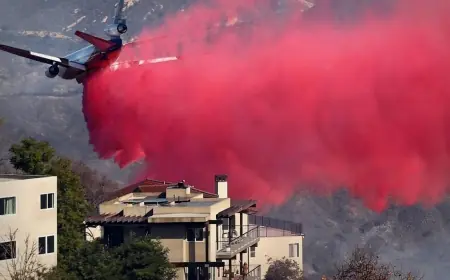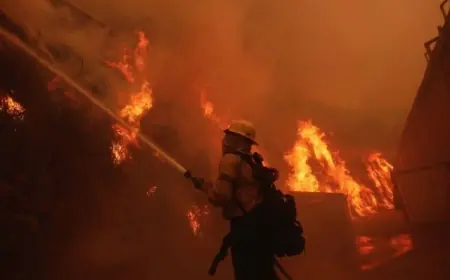
SS Narayana Health Super Specialty Centre Performs Central Karnataka's First Orbital Atherectomy
Daily Mail 24 Jan 16, 2025

Post-Test Series Loss, BCCI Sends Indian Stars to Domestic Cricket Arena, Here is the List of Star Players
Daily Mail 24 Jan 21, 2025

Hubballi: Police Commissioner Emphasizes Vigilance in Cash Movement Operations
Daily Mail 24 Jan 20, 2025

Hubballi: Miscreants Target Nationalized Bank, Fail to Gain Entry
Daily Mail 24 Jan 20, 2025

Lakshmi Hebbalkar Responding Well to Treatment, Discharge Expected Soon: D.K. Shivakumar
Daily Mail 24 Jan 18, 2025

‘Vijayendra You Are Just a Kid’: Jarkiholi's Scathing Remarks Spark Row
Daily Mail 24 Jan 18, 2025

Dharwad: Town Police Solve House Burglary Case, Recover Valuables Worth ₹6.45 Lakh
Daily Mail 24 Jan 18, 2025

India Unveils 15-Member Squad for Champions Trophy 2025; Rohit to Lead, Jaiswal Makes ODI Debut
Daily Mail 24 Jan 18, 2025

Old Hubballi Man Arrested for Sexually Assualting Minor; Investigation Points to Serial Offences
Daily Mail 24 Jan 18, 2025

13 km in 13 Minutes: Hyderabad Metro Creates Green Corridor for Emergency Heart Transfer
Daily Mail 24 Jan 18, 2025

8th Pay Commission Approved: Highlights and Impact on Central Government Employees
Daily Mail 24 Jan 16, 2025

Hubballi: ‘Math and Mandir Are Living Institutions of Social Change,’ VP Highlights at Sumeru Parvata Inauguration
Daily Mail 24 Jan 16, 2025

Why the BCCI Chose Sitanshu Kotak as Batting Coach Over Big Names Like Kevin Pietersen
Daily Mail 24 Jan 16, 2025

Bike-Borne Robbers Escape with Cash After Killing Security Guard in Bidar
Daily Mail 24 Jan 16, 2025

Saif Ali Khan Recovering After Knife Attack During Burglary Attempt
Daily Mail 24 Jan 16, 2025

SS Narayana Health Super Specialty Centre Performs Central Karnataka's First Orbital Atherectomy
Daily Mail 24 Jan 16, 2025

Post-Test Series Loss, BCCI Sends Indian Stars to Domestic Cricket Arena, Here is the List of Star Players
Daily Mail 24 Jan 21, 2025

Hubballi: Police Commissioner Emphasizes Vigilance in Cash Movement Operations
Daily Mail 24 Jan 20, 2025

Hubballi: Miscreants Target Nationalized Bank, Fail to Gain Entry
Daily Mail 24 Jan 20, 2025

Lakshmi Hebbalkar Responding Well to Treatment, Discharge Expected Soon: D.K. Shivakumar
Daily Mail 24 Jan 18, 2025

‘Vijayendra You Are Just a Kid’: Jarkiholi's Scathing Remarks Spark Row
Daily Mail 24 Jan 18, 2025

Dharwad: Town Police Solve House Burglary Case, Recover Valuables Worth ₹6.45 Lakh
Daily Mail 24 Jan 18, 2025

India Unveils 15-Member Squad for Champions Trophy 2025; Rohit to Lead, Jaiswal Makes ODI Debut
Daily Mail 24 Jan 18, 2025

Old Hubballi Man Arrested for Sexually Assualting Minor; Investigation Points to Serial Offences
Daily Mail 24 Jan 18, 2025

13 km in 13 Minutes: Hyderabad Metro Creates Green Corridor for Emergency Heart Transfer
Daily Mail 24 Jan 18, 2025

8th Pay Commission Approved: Highlights and Impact on Central Government Employees
Daily Mail 24 Jan 16, 2025

Hubballi: ‘Math and Mandir Are Living Institutions of Social Change,’ VP Highlights at Sumeru Parvata Inauguration
Daily Mail 24 Jan 16, 2025

Why the BCCI Chose Sitanshu Kotak as Batting Coach Over Big Names Like Kevin Pietersen
Daily Mail 24 Jan 16, 2025

Bike-Borne Robbers Escape with Cash After Killing Security Guard in Bidar
Daily Mail 24 Jan 16, 2025

Saif Ali Khan Recovering After Knife Attack During Burglary Attempt
Daily Mail 24 Jan 16, 2025

SS Narayana Health Super Specialty Centre Performs Central Karnataka's First Orbital Atherectomy
Daily Mail 24 Jan 16, 2025























































